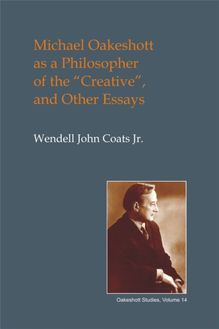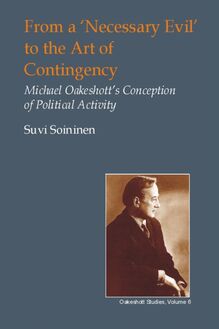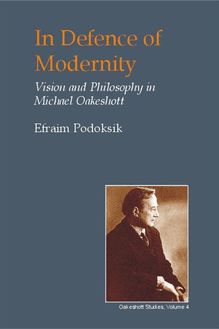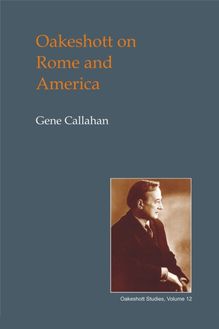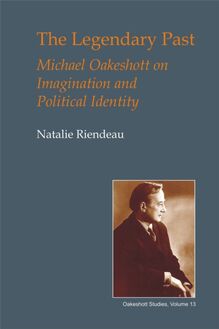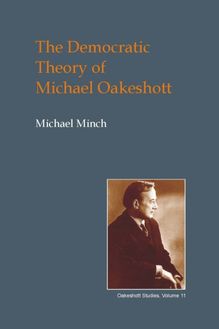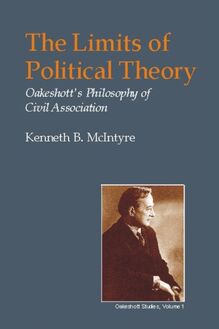Legendary Past , livre ebook
172
pages
English
Ebooks
2014
Vous pourrez modifier la taille du texte de cet ouvrage
Obtenez un accès à la bibliothèque pour le consulter en ligne En savoir plus
Découvre YouScribe en t'inscrivant gratuitement
Découvre YouScribe en t'inscrivant gratuitement
172
pages
English
Ebooks
2014
Vous pourrez modifier la taille du texte de cet ouvrage
Obtenez un accès à la bibliothèque pour le consulter en ligne En savoir plus
Publié par
Date de parution
10 décembre 2014
Nombre de lectures
2
EAN13
9781845407834
Langue
English
Publié par
Date de parution
10 décembre 2014
Nombre de lectures
2
EAN13
9781845407834
Langue
English
Title page
The Legendary Past
Michael Oakeshott on Imagination and Political Identity
Natalie Riendeau
imprint-academic.com
Publisher information
Copyright © Natalie Riendeau, 2014
2014 digital version by Andrews UK Limited
www.andrewsuk.com
The moral rights of the authors have been asserted.
No part of this publication may be reproduced in any form without permission, except for the quotation of brief passages in criticism and discussion.
Originally published in the UK by
Imprint Academic, PO Box 200, Exeter EX5 5YX, UK
Originally distributed in the USA by
Ingram Book Company,
One Ingram Blvd., La Vergne, TN 37086, USA
Dedication
For my family, friends, and teachers
Abbreviations
CPJThe Concept of a Philosophical Jurisprudence
EMExperience and its Modes
HCOn Human Conduct
HCAHobbes on Civil Association
LHPTLectures in the History of Political Thought
MPMEMorality and Politics in Modern Europe
OHOn History and Other Essays
PFPSThe Politics of Faith and the Politics of Scepticism
RPRationalism in Politics and Other Essays
RPMLReligion, Politics and the Moral Life
VMESThe Vocabulary of a Modern European State
VLThe Voice of Liberal Learning
WHWhat is History? and Other Essays
Introduction
Humans, Michael Oakeshott declares, inhabit a ‘mysterious and menacing universe’. [1] While this might sound like a dramatic declaration (an example of Oakeshott’s colourful use of language), a hyperbole the meaning of which may be easily dismissed or deemed to be only of relatively minor importance to his thought, such a conclusion would, in fact, be mistaken. The idea that humans are able to find their way in a menacing and mysterious universe, more than this, that they are successful in making themselves at home in such a world, an achievement that paves the way for ‘human living-together’, to use Hannah Arendt’s expression, and consequently the political, is key to Oakeshott’s political thought. [2] Humans, he observes, know who they are, where they are in the world and how they came to be there. In other words, they have an identity, a sense of self-consciousness as well as of self-understanding, as do their societies. [3] Oakeshott contends that it is human imagination, by means of an ‘epic story of the past’, which endows humans and their societies with identity, self-consciousness and self-understanding, thereby ensuring the successful accomplishment of the ‘primordial activity of making ourselves at home in the world’. [4] [5] Imagination creates a world of sense and meaning for humans to inhabit.
This kind of reflection on the human need to inhabit a world of sense, a world created by the human imagination, is perhaps not commonly associated with Oakeshott. The key role played by imagination in Oakeshott’s thought is largely overlooked or ignored by commentators. Yet, imagination is a fundamental element of his reflection on the political since it is intimately linked to the problem of human living-together and of identity, two themes which characterize his thought. When examining the question of human living-together, commentators typically focus on Oakeshott’s writings on the civil association and the civil condition. In On Human Conduct , Oakeshott defines the civil association as a rule-articulated association. Within the context of the civil condition, all that is required to sustain human living-together is the continued recognition of the authority of the rules of association as rules. [6] The idea that a common good or a common purpose might ensure social cohesion is rejected by Oakeshott as this sort of endeavour belongs to enterprise association and impedes individual freedom. Civil association allows individuals to pursue their own projects so long as this is done within the context of the recognized rules of the association. [7] Nothing more is required to sustain an association of individuals. As for political activity, it is the modification of the rules in order that they conform to current social realities. That is, individuals who live together over time develop a political tradition of behaviour, or practice, and, when well versed in their tradition, are able to identify the changes it intimates in order to ensure its coherency and, thus, its continued existence. [8] Oakeshott contends that such an understanding of civil association and of the civil condition cannot be founded. [9] In this sense, the conception of the political he defends is devoid of foundations. This leads observers to conclude that Oakeshott’s political thought is antifoundationalist.
I do not dispute the fact that civil association and politics understood as a traditional manner of behaviour are fundamental to Oakeshott’s conception of the political. However, this is only a partial view of Oakeshott’s thought on the political, one that overlooks the fundamental question of identity. Although little attention is paid in the secondary literature to the matter of identity, it is of central importance to Oakeshott, and, in particular, to his conception of conservatism. A political society cannot function without an identity and sense of self-consciousness. This is simply inconceivable for him. Rules and judicial procedure cannot endow a society with its identity and ensure its continued existence. Simply put, human living-together requires more than the continued recognition of the authority of rules by cives . This is where imagination, political imagination to be precise, comes into play. In what follows, I show that it is by means of what Oakeshott terms legends of political life that the political imagination endows a society with its identity and sense of self-consciousness. What is more, legends of political life ensure that a society’s identity and sense of self-consciousness do not become corrupted by change. Political legends, then, satisfy certain basic human needs: they situate us in time and space; they tell us who we are, where we are in the world, how we came to be here and they project us into the future. In short, what legends of political life provide is stability. It is these creations of the political imagination that stabilize a political society. Given legends’ stabilizing function in relation to society, I claim that they in fact serve as weak foundations for the political. Thus, although civil association, tradition and practice may be devoid of foundations, a society’s identity and sense of self-consciousness are founded. Legends of political life are a very specific kind of foundation. They may be said to be a type of constructed foundational narrative. For this reason, I argue that Oakeshott is a weak foundationalist in the constructivist tradition established by Hannah Arendt, who is well known for her theoretical work on foundational narratives. In other words, I do not make the claim that foundations understood as ‘”prior” claims about unquestionable or sacred or natural premises’ are to be found in Oakeshott’s political thought. [10] Rather, by foundations I mean stabilizing constructs for the political. It is in this sense that political legends should be understood to found the identitary element of human living-together.
I posit that Oakeshott’s concept of legends of political life is composed of three constitutive elements: reflection upon the political, the practical past and poetry. Perhaps the best known legend of political life, and the most successful in Oakeshott’s opinion, is the one created by the poets of Ancient Rome and which tells the story of the foundation of Rome. No other legend of political life, Oakeshott contends, has surpassed the Roman legend in its ability to endow a people with an identity, a sense of self-consciousness and of self-understanding. The Roman political legend is a text-book example of how together poetry, the practical past and foundational reflection upon the political work to stabilize a society. The story of the foundation of Rome by Romulus is an event recalled to mind from the practical past, the story of which, constructed or created by Roman poets, endows Roman political society with its identity and heightened sense of political self-consciousness. As the case of Rome highlights, the practical past is emblematic and not historical. As such, the practical past transforms the lives, utterances, achievements and sufferings of mankind into emblematic actions and pronouncements. These emblems are not evoked in a procedure of critical historical enquiry, but are recalled to mind as unproblematic images. Their purpose is not to inform us about the historical past. Rather, they are valued for their present usefulness. As the example of Rome demonstrates, their usefulness lies in their capacity to stabilize the practical present. To this end, the practical past constitutes a vocabulary of practical discourse composed of symbolic characters. This practical discourse contains emblems of all the virtues, vices and predicaments known to mankind. [11] Political societies have recourse to this vocabulary of symbolic characters in order to secure their identity. Romans, Oakeshott contends, astutely secured their identity by recalling the emblematic action of the foundation of Rome by Romulus. Moreover, the kind of reflection upon the political the Roman legend of political life affords allowed Roman society to understand its political experience in the idiom of general ideas. The Roman political legend founds Roman society in so far as it endows it with its heightened sense of political self-consciousness and its identity. However, the foundational role of political legends does not end here. The Romans augmented their legend by binding all political change back to the story of the foundation of Rome, thereby augmen

